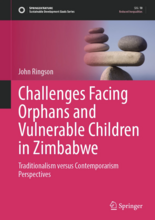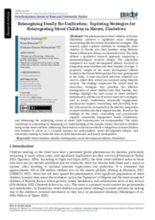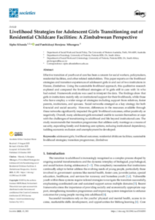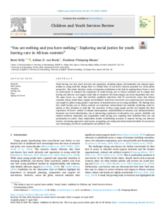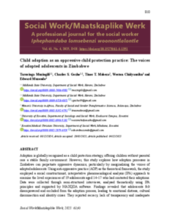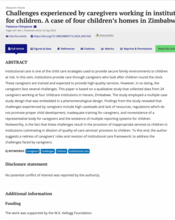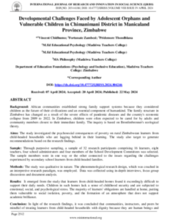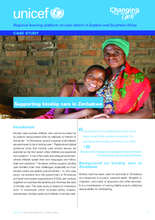Displaying 1 - 10 of 136
This book explores the challenges facing orphans and vulnerable children in Zimbabwe within the broader context of the Global South, highlighting how poverty, inequality, HIV/AIDS, and economic instability deepen children’s vulnerability. Drawing on Ubuntu philosophy, neoliberalism, and African Renaissance perspectives, it underscores the importance of community-led, culturally sensitive, and African-driven approaches to inform policy and practice supporting OVCs.
This study examines strategies for reintegrating street children in Harare, Zimbabwe, into their families, highlighting the root causes of homelessness and the need for psychosocial support, counselling, family conferences, and community engagement. It emphasizes innovative, evidence-based approaches to ensure effective family reintegration and informs policymakers, social development officers, and researchers addressing child homelessness.
This study explores the transition and livelihood strategies of adolescent girls in and out of institutional care in Harare, Zimbabwe, comparing 16 girls still in care with 16 who had exited. Findings reveal that girls leaving care rely on diverse social networks for survival but often struggle to sustain themselves, highlighting the need for transition programs that reduce institutional dependency, prevent early marriage, and promote economic inclusion.
This article uses Nancy Fraser’s social justice framework to examine the experiences of youth leaving care in Ghana, South Africa, Uganda, and Zimbabwe, drawing on interviews with 45 care-leavers conducted by peer researchers. Findings reveal how intersecting injustices—such as stigma, exclusion, and lack of resources—undermine their transition to adulthood, underscoring the need for stronger aftercare services, recognition of diverse identities, and greater youth participation in shaping policy and support.
Adoption in Zimbabwe, while intended to provide stable families for children without parental care, often marginalizes adopted adolescents by excluding them from decisions, limiting transparency, and severing cultural ties. This study highlights the emotional distress and identity challenges this creates and calls for more inclusive, transparent, and culturally grounded adoption practices that uphold children’s rights and voices.
You’re invited to the upcoming webinar Including support for informal kinship care in policy on 6 November at 13:00 UTC. In this webinar, panelists will explore and demonstrate how kinship care can be included in policy and supported without formalisation.
This paper is based on a qualitative study that collected data from 24 caregivers working at four childcare institutions in Harare, Zimbabwe. Findings from the study revealed that challenges experienced by caregivers include high caseloads and lack of resources, regulations which do not promote proper child development, inadequate training for caregivers, and nonexistence of a representative body for caregivers and the existence of multiple reporting systems for children.
This workshop explores why it is important to support care leavers networks, and how these networks can be supported. The workshop was designed and facilitated by care leavers, with presentations from a regional network working across Africa, and networks in Uganda and Zimbabwe.
The study investigated the psychosocial consequences of poverty on rural Zimbabwean learners from child-headed households who are lagging behind in their learning. The study also aimed to generate recommendations based on the research findings.
In this case study, the authors explore how the government of Zimbabwe and local civil society organisations (CSOs) are working together to maximise the benefits and minimise the risks of kinship care. The case study is based on interviews with 12 individuals which included policy makers, practitioners, kinship carers and children in kinship care.

